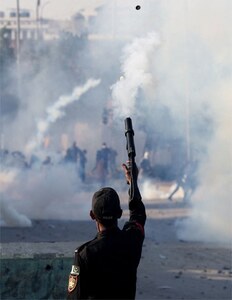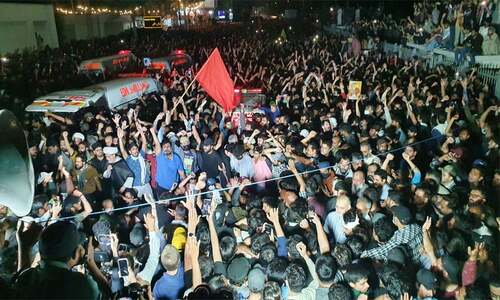KARACHI, May 30: Writer, playwright and educationist Haseena Moin in conversation with veteran journalist and author Zubeida Mustafa during a programme organised by the Karachi Gymkhana library and literary sub-committee in collaboration with the South Asia Women in Media was able to bring out all those positive things about the latter’s personality and life that the lady herself was too modest to say.
“In this world today, when the mention of Pakistan brings up negative things like ‘terrorism’, we are relieved to hear a writer and scholar like Mrs Mustafa’s name as we know that it is one of the positive things about our country, something to be proud of,” said Ms Moin.
“This is a woman who has designed her life through her willpower. Her success in her own words is her own without any help from any man. The path she walks on is one that she has created herself,” she added while introducing the journalist, who started her professional life as a researcher with the Pakistan Institute of International Affairs (PIIA).
“Back in those days when I was working with the PIIA, people did not understand what it meant and confused it with the national airline. Whenever I tried explaining my work to them, they thought that maybe I was a typist as the concept of women doing something other than becoming a teacher or doctor was rather new then,” said Mrs Mustafa.
From there, Ms Moin brought up Mrs Mustafa’s going for a PhD to the London School of Economics. “Well, it’s amazing that you were able to complete your work there in just six months,” she commented.
But Mrs Mustafa corrected her quickly saying that she never was able to complete her doctorate as she missed her little baby girl back home. “I missed my little baby, who I had left with my mother-in-law, so much that I just couldn’t concentrate on my research work there. Then someone pointed out to me that I could complete my PhD thesis anytime in my life but my daughter’s childhood could be enjoyed only once. That’s when I packed up my bags to return home,” she said.
“A woman and a mother can do so much in the world without making war because she has her child in her lap,” Ms Moin added.
“Yes, women bring life into the world, they can’t possibly think of taking life. That’s why they are always peace-loving,” Mrs Mustafa said.
From there on the conversation turned to Mrs Mustafa’s work as a journalist. “I was sitting at home for six years, bringing up my little girls. I used to freelance occasionally and that’s when Dawn newspaper’s editor the late Ahmad Ali Khan sahib discovered me. He was looking for leader writers for the paper and wanted to meet me. On knowing a bit more about me during our meeting, he offered me the job but was concerned about how I would juggle the work while taking care of my children.
That’s when he himself suggested that I leave for home as soon as I hand in my editorial everyday. I’m grateful for the support,” she said.
About her writing, she said, “My background of a Master’s in International Relations came very much handy as it was considered safe to write about the politics of other countries but our own in 1975 when I joined the newspaper. Later, Khan sahib suggested that I also shift my focus to the social sector, which proved to be a challenge for me as it was easy to get information about international issues from the many foreign publications on offer here but how to find out what was going on locally,” she said.
“That’s when I built a close association with our newspaper reporters to know about what their sources were saying.”
About her association with the Sindh Institute of Urology and Transplantation (SIUT), she said that it was again her editor Khan sahib who wanted her to investigate the place when it started work in 1991. “It was located in a hospital and we all know how dirty and filthy our government hospitals can be. But the moment I entered the SIUT building, I immediately felt a difference. When a charitable organisation works well here, even the people gain confidence in it and donate freely to it,” the journalist pointed out.
Mrs Mustafa has also written two books. Her recent one is about the SIUT but the one before it is Tyranny of Language, a research about teaching children in their mother tongue in school initially. “Neurologists and researchers say that a child already knows a lot when starting school but he or she suddenly receives a shock on starting school as the medium of instruction there is not in the mother tongue. Therefore, it is better to teach in the mother tongue first and introduce other languages in higher classes,” Mrs Mustafa explained. “That will do away with this culture of learning by heart that we see so much here,” she concluded.






























